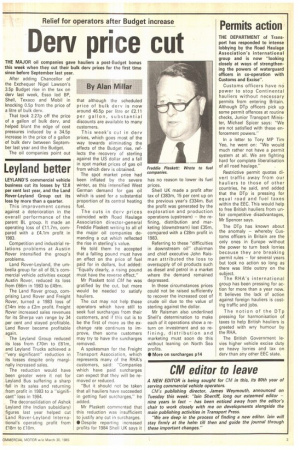Dent price cut
Page 7

If you've noticed an error in this article please click here to report it so we can fix it.
THE MAJOR oil companies gave hauliers a post-Budget bonus this week when they cut their bulk dery prices for the first time since before September last year.
After adding Chancellor of the Exchequer Nigel Lawson's 3.5p Budget rise in the tax on dery last week, Esso led BP, Shell, Texaco and Mobil in knocking 0.5p from the price of a litre of bulk derv.
That took 2.27p off the price of a gallon of bulk derv, and helped blunt the edge of cost pressures induced by a 34.5p increase in the price of a gallon of bulk dery between September last year and the Budget.
The oil companies point out that although the scheduled price of bulk dery is now around 46.5p per litre or £2.11 per gallon, substantial discounts are available to many customers.
This week's cut in dery prices, which goes most of the way towards eliminating the effects of the Budget rise, reflects the recovery of sterling against the US dollar and a fall in spot market prices of gas oil from which dery is obtained.
The spot market price had been inflated by the severe winter, as this intensified West German demand for gas oil which is used for a substantial proportion of its central heating fuel.
The cuts in dery prices coincided with Road Haulage Association director-general Freddie Plaskett writing to all of the major oil companies demanding a cut which reflected the rise in sterling's value.
He told them he accepted that a falling pound must have an effect on the price of fuel paid for in dollars, but added: "Equally clearly, a rising pound must have the reverse effect."
Mr Plaskett told CM he was gratified by the cut, but more would be needed to satisfy hauliers.
The cut may not help those operators which have still to seek fuel surcharges from their customers, and if this cut is to be the first of more as the exchange rate continues to improve, then some customers may try to have the surcharges removed.
A spokesman for the Freight Transport Association, which represents many of the RHA's customers, said: "Companies which have paid surcharges can expect that they will be removed or reduced.
"But it should not be taken that all hauliers have succeeded in getting fuel surcharges," he added.
Mr Plaskett commented that this reduction was insufficient to justify any cut in surcharges.
• Despite reporting increased profits for 1984 Shell UK says it has no reason to lower its fuel prices.
Shell UK made a profit after tax of £383m, 15 per cent up on the previous year's £334m. But the profit was generated by the exploration and production operations (upstream) the refining, distribution and marketing (downstream) lost £35m, compared with a £28m profit in 1983.
Referring to these "difficulties in downstream oil" chairman and chief executive John Reisman attributed the loss to oversupply of oil products such as diesel and petrol in a market where the demand remained depressed.
In these circumstances prices could not be raised sufficiently to recover the increased cost of crude oil due to the value of sterling against the dollar.
Mr Raisman also underlined Shell's determination to make each of it operations show a return on investment and so refining, distribution and marketing must soon do this without leaning on North Sea profits.
• More on surcharges p14
























































































































































